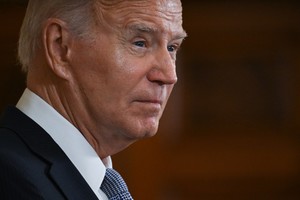When Doing the Right Thing Hurts

For those of us who believe in the importance of a safe and secure Israel, Joe Biden’s international leadership in the tumultuous time since Hamas’ terrorist attacks on the Jewish homeland has been admirable. Biden called the attacks “sickening” and “pure evil”, comparing them to the 9/11 terrorist strikes on this country. The president has pledged U.S. financial and military support to Israel, warned Iran and other adversaries in the region to stay out of the fight, and traveled to Israel to figuratively and literally embrace Prime Minister Benjamin Netanyahu.
Biden’s Democratic Party, which has been facing significant internal divisions regarding Israel, has largely closed ranks behind Biden. Public opinion polls show that support for Israel among U.S. voters is at its highest level in years, and that the American public has strongly backed the president on his handling of the issue. Even Jewish and pro-Israel Republicans and other longtime Biden critics have applauded his actions.
But history shows that foreign policy victories are of little use to presidents seeking re-election. Success in this conflict is far from assured, but even a positive outcome for Israel and its allies could end up harming Biden’s political prospects rather than helping him. It’s entirely possible that by next November, analysts could look back at the Israel-Hamas war as a key contributing factor in Biden’s defeat.
The first and most direct impact on the president’s re-election may be economic. Even with record-low unemployment, ongoing high inflation has caused U.S. voters to disapprove of Biden’s approach to economic matters by immense margins. If the conflict between Israel and Hamas spreads into regional warfare, history tells us that Middle Eastern oil supplies to the rest of the world could be greatly diminished. Given how America’s own energy resources have grown over the years, it’s unlikely that we’ll see a return to the lines at gas stations that accompanied 20th-century wars between Israel and its neighbors. But for voters already grappling with uncomfortably high prices for basic household necessities, a spike in the cost of gasoline will cause even more unhappiness and could easily be laid at the feet of the incumbent president.
The second potential problem for the Biden campaign could be depressed voter turnout among loyal Democrats. Even as Democratic support for Israel has grown over the last two weeks, the most notable holdouts are among the party’s base. Young people and other self-described progressive voters tend to be much more likely to prioritize the Palestinian cause over Israel. A small but vocal number of Democratic House members have spoken out against Biden’s enthusiastic backing of Israel and called for an immediate cease-fire. Progressive voter groups around the country have similarly criticized both Biden and Netanyahu. The last thing the president needs is one more reason for disillusioned left-leaning voters to tune him out altogether. Biden is currently running close to even in head-to-head polling matchups with Donald Trump, and a pronounced lack of enthusiasm among these voters is a major contributor to that challenge. Even if most Americans currently agree with Biden’s approach to Israel, the voters he needs the most are much less inclined to sign on.
Finally, we know that it’s extremely rare that a presidential election turns on foreign policy. George H.W. Bush famously lost his reelection barely a year after leading the West to victory in the Iraq war, turned out by voters who had turned the page and wanted a leader more focused on economic matters and other domestic priorities. But Harry Truman and Lyndon Johnson both chose not to seek re-election rather than risk defeat during previous military engagements. Biden is an experienced internationalist, and one of his greatest strengths is his familiarity with global politics. But the tangible challenges he faces in the Middle East, in Ukraine and in China will make it exceedingly difficult for him to pivot back to the home front in time for voters to believe that their interests are his top priority.
And of course, we also know that no war is ever again as popular as it was on its first day. Given the likelihood that world news coverage will continue to shift from the atrocities committed against Israelis on October 7 toward the carnage now engulfing Gaza, public opinion could very easily turn as news footage from the war zone fills American screens. None of which suggests a political windfall for Biden, even for doing the right thing.
Want to talk about this topic more? Join Dan for his webinar "Politics In The Time of Coronavirus." Or read more of Dan’s writing at: www.danschnurpolitics.com.
Dan Schnur is a Professor at the University of California – Berkeley, Pepperdine University, and the University of Southern California, where he teaches courses in politics, communications and leadership. Dan is a No Party Preference voter, but previously worked on four presidential and three gubernatorial campaigns, serving as the national Director of Communications for the 2000 presidential campaign of U.S. Senator John McCain and the chief media spokesman for California Governor Pete Wilson. He has a Center bias.
This piece was reviewed and edited by Isaiah Anthony, Deputy Blog Editor (Center bias).

May 9th, 2024

May 7th, 2024

May 7th, 2024